
Both India and Pakistan know that improved relations between the two countries will benefit their countries, but will the two countries finally take steps to ensure that their relations improve. There have been indications for the last few months, ever since Pakistan’s elections took place, that maybe after India’s elections things may improve.
A recent exchange of X posts between Pakistani leaders and Indian Prime Minister Narendra Modi marked the beginning of the latter’s third term as prime minister of India. Prime Minister Shehbaz Sharif posted a brief message of “felicitations”, to which Mr Modi responded with an equally brief “thank you”. The PM’s elder brother Nawaz Sharif’s post was more verbose and a tad warmer as he addressed “Modi Ji” in a personalised manner, expressing his wish that hope would replace hate in the subcontinent. Mr Modi returned the compliments, albeit twice highlighting the need for “security”.
Yet, unlike in 2014 when Modi invited then PM Nawaz Sharif to his inauguration – this time round all other South Asian leaders were invited but not the Pakistani PM. In his first press conference, returning External Affairs Minister Dr Jaishankar noted that ties with Pakistan would only improve if a solution to India’s concerns over ‘cross border terrorism’ was found.
At the end of the day, it is in Pakistan’s own interest to have a normal, non-adversarial, relationship with its next-door neighbor, India. Pakistan’s economic problems will improve dramatically if it starts trading with India, something which is inexplicable considering that if China can trade with India, why cannot Pakistan?
An editorial in Dawn called upon both governments to begin the process of normalisation through small steps like restoration of full diplomatic ties and back-channel dialogue discreetly initiated.
![]()





